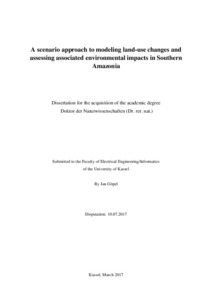| dc.date.accessioned | 2018-12-03T15:01:07Z | |
| dc.date.available | 2018-12-03T15:01:07Z | |
| dc.date.issued | 2017-03 | |
| dc.identifier | doi:10.17170/kobra-2018112826 | |
| dc.identifier.uri | http://hdl.handle.net/123456789/11005 | |
| dc.language.iso | eng | |
| dc.rights | Urheberrechtlich geschützt | |
| dc.rights.uri | https://rightsstatements.org/page/InC/1.0/ | |
| dc.subject | Amazonia | eng |
| dc.subject | land use change | eng |
| dc.subject | modeling | eng |
| dc.subject | scenario analysis | eng |
| dc.subject | scenarios | eng |
| dc.subject.ddc | 620 | |
| dc.title | A scenario approach to modeling land-use changes and assessing associated environmental impacts in Southern Amazonia | eng |
| dc.type | Dissertation | |
| dcterms.abstract | Humanity has left its footprint on the surface of the earth since it managed to purposefully employ tools and fire to its specific needs. Especially the conversion of natural habitats into agricultural productive land has transformed close to forty percent of the natural land-cover in order to satisfy global demands for food, raw materials, and energy. One current example of dynamic land-use and land-cover changes can be witnessed in Southern Amazonia. Spatially explicit land-use change models are applied to investigate such processes and to identify associated environmental impacts in a multitude of cases. In this context, land-use change models are utilized to understand the determining factors of past and current land-use change dynamics. This knowledge can be put to use in order to explore possible future land-use development pathways. However, modeled land-use and land-cover changes show sensitivities to used model input and applied methods. Modeling these dynamics based on different land-cover products, input sources and methods to estimate parameter weights on a regional scale can result in a range of modeling and subsequent impact assessment results. Therefore, the first objective of this thesis is to explore sensitivities of land-use change modeling- and subsequent impact assessment results to different initial land cover products, input variables derived from different sources, and different methods used for model parameter estimation. Modeling possible future land-use change requires assumptions about the development of its determining factors. Socio-economic scenarios include speculations about population development, changes of global demand and supply, and political changes amongst others. Based on this information, possible future land-use trajectories can be explored and associated environmental consequences can be assessed. The second research objective is to investigate possible future land-use change by assuming four different scenarios. The resulting spatially explicit land-use change allows for an investigation of impacts in the form of greenhouse gas emissions. Moreover, in this thesis the ensuing loss of natural vegetation and vertebrate diversity are assessed. Modeling land-use and land-cover change on the basis of combined qualitative and quantitative scenarios has advantages. However, one challenge of generating such scenarios is the translation of qualitative assumptions into numerical model input that can be used to simulate land-use change scenarios. Consequently, the third research objective is to critically review and analyze the process of translating qualitative assumptions into suitable model inputs in regard to the scenarios applied in this thesis. The findings of this thesis can aid future land-use and land-cover change modeling exercises and can be used to improve future scenario development processes. Moreover, the regional modeling of land-use and land-cover changes and the assessment of associated environmental impacts on the basis of assumed socio-economic developments gives a detailed impression of how the land-use future might unfold in Southern Amazonia. Also, the results can be utilized to research possible land-use policy implications in the study area. | eng |
| dcterms.accessRights | open access | |
| dcterms.creator | Göpel, Jan | |
| dcterms.dateAccepted | 2017-07-10 | |
| dc.contributor.corporatename | Kassel, Universität Kassel, Fachbereich Elektrotechnik / Informatik | |
| dc.contributor.referee | Schaldach, Rüdiger (Prof. Dr.) | |
| dc.contributor.referee | Alcamo, Joseph (Prof. Dr.) | |
| dc.relation.projectid | 01LL0902A - 01LL0902N | |
| dc.subject.swd | Brasilien | ger |
| dc.subject.swd | Landnutzung | ger |
| dc.type.version | publishedVersion | |

